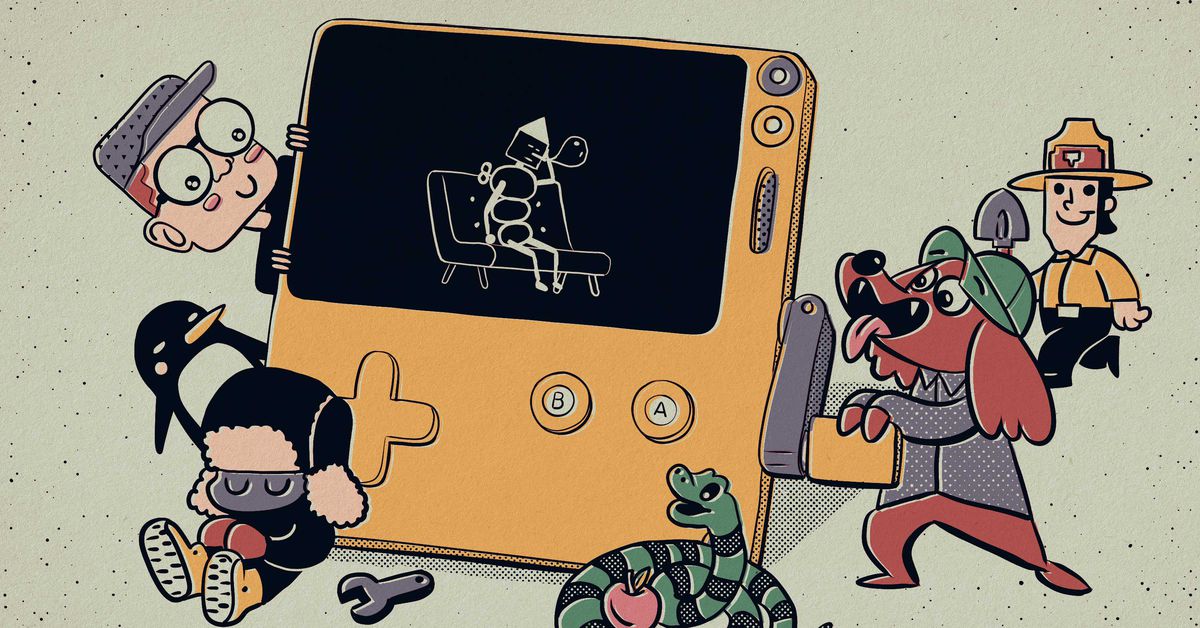
The team at indie games studio RNG Party has always loved handheld gaming, particularly Nintendo’s quirky portable devices. So when they noticed a new handheld making waves on Twitter, one that looked a lot like a tiny yellow Game Boy, they knew they had to be a part of it. “With pretty much every major console maker now gone from this space, unless you count the Nintendo Switch, this kind of thing might only ever be possible for us once,” explains RNG’s Ben Busche. “And we didn’t want to miss out.”
That device was the Playdate, a handheld from longtime Mac software developer Panic, which is defined both by its miniature stature and the crank sticking out of its side. It finally released earlier this year, and those who purchased one received access to a “season” of games; two new titles would be automatically downloaded every week for 12 weeks, and Panic managed to get notable developers like Keita Takahashi and Bennett Foddy on board. New Playdate owners are pretty set when it comes to new games, at least for a few months.
But there’s another way for developers to support the Playdate — and for some, being a part of that initial rush of excitement was a key strategy for a viable launch. Outside of the season structure, the device also supports sideloading games, so developers can still make and release titles for it even if they aren’t included in the season. Right now, Itch.io is the best place to find these experiences; the “Playdate” tag features dozens of games and apps, ranging from small experiments to full-blown narrative adventures.
“Releasing as soon as we could helped us guarantee eyes on the game, which we knew would be more difficult for us to do as more time passed,” explains Busche. “We are a small team of three with nearly no budget, so this was one of the few ways we could think of to help ‘market’ our game.”
RNG had the benefit of being part of the developer preview program, giving the studio access to the hardware nearly two years before it launched. During that time they developed Bloom, a combination of visual novel and gardening sim, that tells the story of a young woman’s life as she opens up a rooftop flower shop. It’s a game designed to be played in short spurts; there’s waiting involved as flowers bloom over time, and you interact with other characters via text messages. Busche, who worked on the writing, music, and art of Bloom, says that structure was very intentional. “The ‘check-in everyday’ nature of the game’s design was done because we knew players would already be checking the device for new games during season one,” he explains.
Bloom is also one of the more expensive games you can buy for the Playdate, at $9.99, which Busche says was meant to “help set a precedent when it came to what Playdate games could be and what they could cost, to help third-party developers be financially viable.”
For Philipp Stollenmayer, a developer known for novelty mobile apps like Verticow and Bacon – The Game, his initial interest in the Playdate had to do with its potential for goofy humor. “I was really having the time of my life developing a basic physics engine from scratch and coming up with ideas to handle the device limitations,” he says. Stollenmayer ended up releasing a game called A Joke That’s Worth $0.99, in which players have to use the Playdate’s crank to keep a bouncing figure up in the air in order to hear a joke being read out loud. It’s as hard as Flappy Bird, but with an absurdist sense of humor (and an annoyingly-catchy theme song).
Both developers say that releasing early on in the Playdate’s lifespan was a good decision. Busche says Bloom’s launch “has exceeded our expectations already, both in sales and reception,” and hit its sales goal within one month. (It has also already outsold the studio’s previous game, the dungeon crawler Backspace Bouken, which is available on the much more widely available Steam.) A Joke That’s Worth $0.99, meanwhile, has sold around 2,000 copies so far; Stollenmayer is donating proceeds to a tree-planting organization. “It didn‘t really feel like work, and it couldn‘t compete with Bacon revenue-wise anyway, so I was looking for something to do with the income, and chose to plant trees from that,” he explains.
As it stands right now, Playdate’s third-party games ecosystem is very decentralized. Players have to go searching for new games to play outside of the device itself, trawling Itch.io for the latest releases. And while sideloading is a fairly painless process on the Playdate — it can be done very quickly over Wi-Fi — it’s not the same as a proper digital store. Panic says it’s working on an app called Catalog, where players can browse games from the handheld itself. “It’s going to be a curated selection of games that we like, that we’ve written, that we’ve commissioned… just found,” Panic’s Greg Maletic told The Verge in April. “We want to make them visible to the Playdate audience.”
There’s no word on when Catalog will launch, but Panic has previously said it will be available “soon.” In the meantime, some of those developers who got in early are reaping the rewards — and are hopeful about the platform’s future. “We personally plan to continue supporting the platform as much as we can,” says Busche. Stollenmayer, meanwhile, was able to find the right audience of weirdos for his goofy game: “I hope the Playdate community can hold this spirit for as long as possible.”
https://www.theverge.com/23151588/playdate-launch-third-party-indie-games
2022-06-30 12:30:00Z
CAIiECkqVhbgljPidpYyO02oaQAqFwgEKg4IACoGCAow3O8nMMqOBjCN2ugF
Bagikan Berita Ini














0 Response to "The Playdate's launch was a unique opportunity for small game developers - The Verge"
Post a Comment